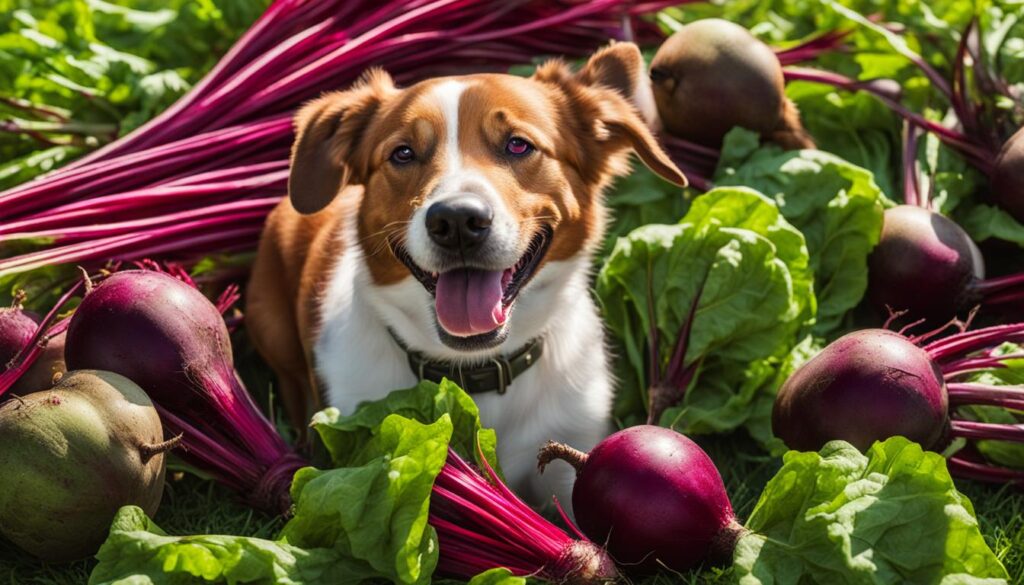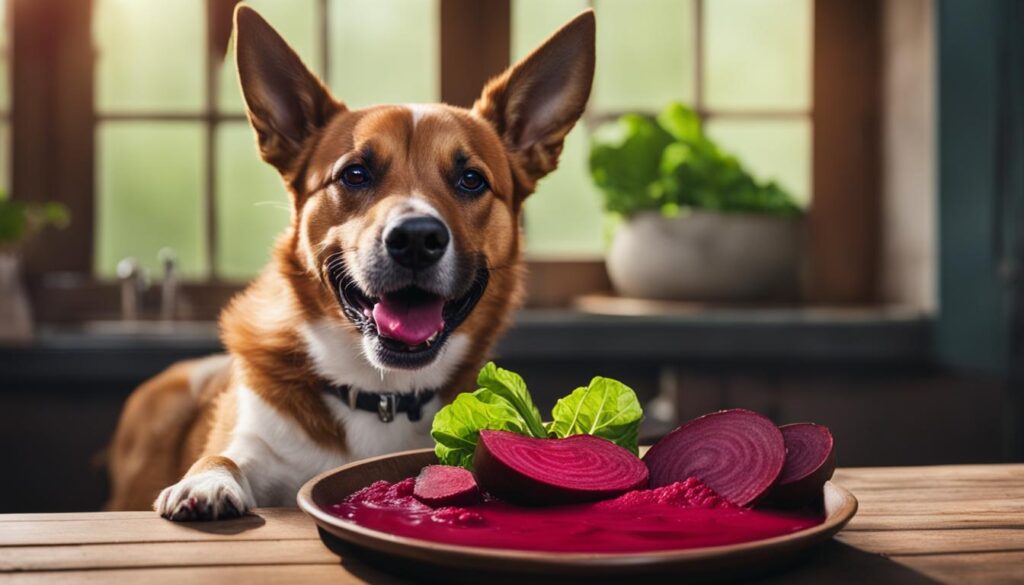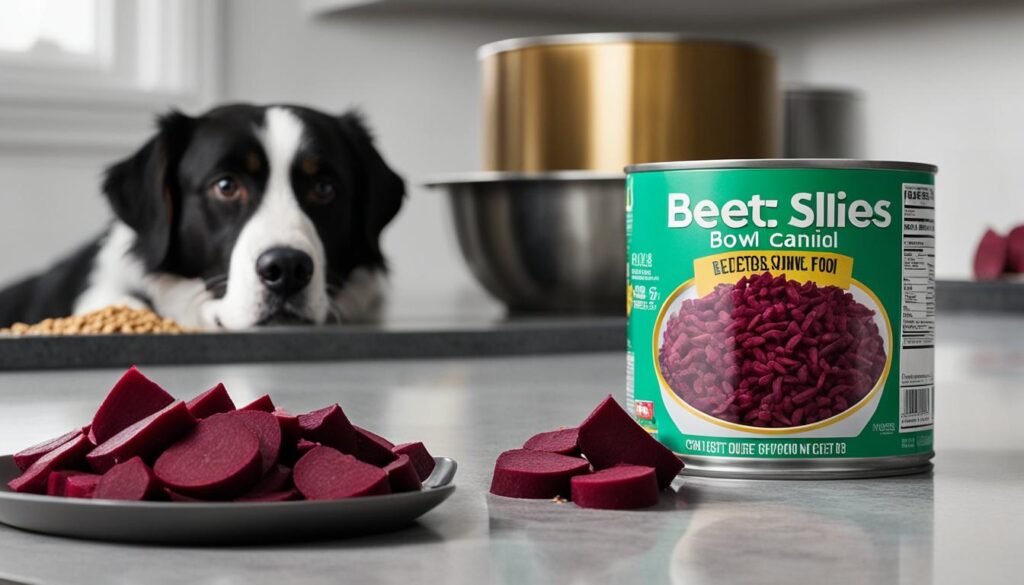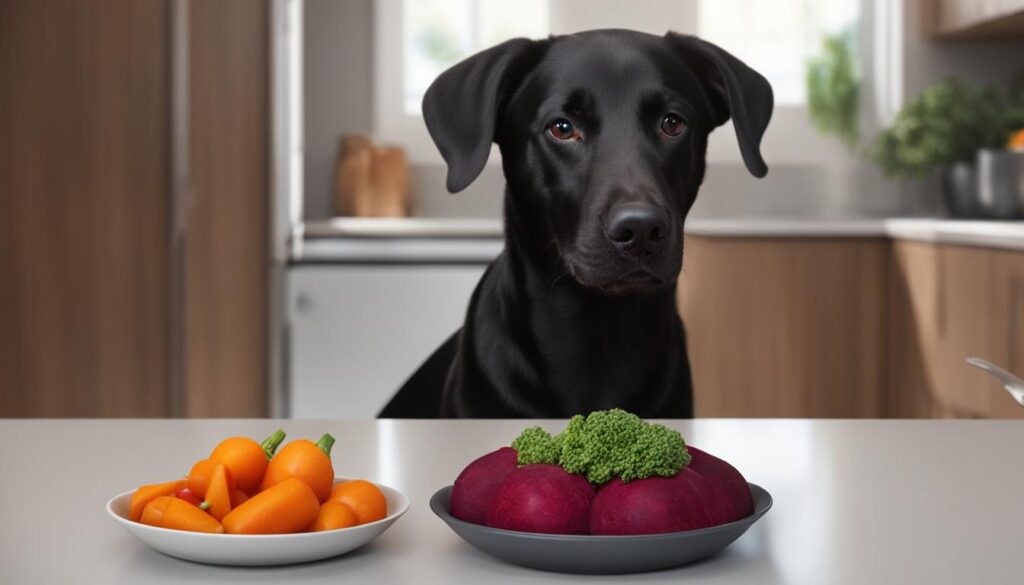Welcome to my comprehensive guide on the topic of feeding beets to dogs. As a pet owner, you may be curious about the nutritional value and potential benefits of incorporating beets into your canine companion’s diet. In this article, I will explore whether beets are good for dogs, discuss their health benefits, potential risks, and provide guidance on safely incorporating this vegetable into your dog’s meal plan.
Beets are not only a colorful and vibrant vegetable but also a nutritious option for dogs when given in moderation. They are packed with fiber, vitamins, and minerals such as Vitamin C, potassium, folate, and magnesium. These essential nutrients can contribute to a dog’s overall health, including their skin, coat, and digestion.
However, it is important to remember that beets should be given in small quantities due to their high oxalic acid content. A high intake of oxalic acid can potentially lead to the formation of bladder stones, urinary crystals, and kidney stones in dogs. Additionally, beets are naturally high in carbohydrates and sugar, so they should only be added as an occasional treat or snack in a dog’s diet.
In the sections that follow, we will dive deeper into the nutritional benefits of beets for dogs, the potential health risks associated with feeding beets, different ways to serve beets to dogs, and recommended portion guidelines. We will also explore other safe vegetables that can be included in a dog’s diet for a well-rounded and balanced nutritional plan.
Key Takeaways:
- Beets can be a nutritious addition to a dog’s diet when served in moderation.
- They are rich in fiber, vitamins, and minerals such as Vitamin C, potassium, folate, and magnesium.
- Beets should be given in small quantities due to their high oxalic acid content, which can pose health risks for dogs.
- It is advisable to consult with a veterinarian before incorporating beets or any new food into a dog’s diet, especially if the dog has any pre-existing health conditions.
- Other safe vegetables such as carrots, spinach, broccoli, and green beans can also be included in a dog’s diet for a balanced nutrition plan.
The Nutritional Benefits of Beets for Dogs

Beets are not only delicious but also offer several nutritional benefits for dogs. These vibrant root vegetables are packed with essential vitamins, minerals, and fiber that can support a dog’s overall health and well-being.
Vitamins in Beets for Dogs
Beets are rich in various vitamins that are beneficial for dogs. They are a good source of Vitamin C, which plays a crucial role in maintaining a strong immune system and promoting collagen production for healthy skin and coat. Additionally, beets contain folate, a B-vitamin that aids in cell growth and development.
Minerals in Beets for Dogs
Beets are a great source of minerals that are important for a dog’s health. They are packed with potassium, an essential nutrient that supports proper muscle and nerve function. Beets also provide magnesium, which helps regulate enzyme activity, and supports bone health.
Fiber in Beets for Dogs
One of the significant nutritional benefits of beets for dogs is their high fiber content. Fiber plays a crucial role in maintaining healthy digestion by promoting regular bowel movements and preventing constipation. It also helps with weight management and may reduce the risk of certain digestive disorders.
Beets for a Dog’s Skin and Coat
The nutrients present in beets, such as Vitamin C and folate, can contribute to a dog’s healthy skin and coat. Vitamin C is essential for collagen synthesis, which helps maintain the skin’s elasticity and promotes a shiny coat. Folate aids in cell regeneration and supports the growth of healthy skin and fur.
Beets for a Dog’s Digestion
Beets’ high fiber content can support a dog’s digestion by promoting regular bowel movements and preventing gastrointestinal issues. Fiber helps regulate the digestive system and may aid in the prevention of conditions such as diarrhea and colitis. Adding beets to a dog’s diet can help maintain a healthy digestive tract.
Overall, incorporating beets into a dog’s diet can provide them with important vitamins, minerals, and fiber that support their overall health. However, it’s essential to feed beets in moderation, as they are high in carbohydrates and natural sugars. Consult with a veterinarian to determine the appropriate amount of beets for your dog’s specific dietary needs.
Potential Health Risks of Feeding Beets to Dogs
While beets can provide several nutritional benefits to dogs, it’s important to be aware of the potential health risks associated with feeding them to your furry friend. Beets contain high levels of oxalic acid, which can lead to the formation of bladder stones, urinary crystals, and kidney stones in dogs.
The high oxalic acid content in beets can also contribute to calcium deficiencies in dogs. This can have negative effects on their bone health and overall well-being. Feeding dogs large quantities of beets can increase the risk of pancreatitis, a painful inflammation of the pancreas, and obesity, which can lead to various health issues.
In addition, some dogs may experience digestive problems such as gas and diarrhea when consuming beets. This can be attributed to the fiber content in beets, which may not be easily digestible for all dogs.
Given these potential health risks, it is crucial to consult with a veterinarian before incorporating beets into your dog’s diet, especially if your dog has a history of bladder stones, urinary crystals, kidney stones, calcium deficiencies, pancreatitis, obesity, or digestive issues. Your veterinarian can provide personalized guidance and recommendations based on your dog’s specific health needs.
Serving Beets to Dogs: Fresh and Cooked Options

When it comes to serving beets to dogs, there are two primary options: fresh and cooked. Both can be incorporated into a dog’s diet, providing they are prepared in the right way.
Fresh Beets for Dogs
Fresh beets are the preferred option, as they retain more of their nutritional value and are free from additives. It is advisable to choose organic beets to reduce the risk of pesticide exposure. Before serving, fresh beets should be thoroughly scrubbed to remove any dirt and then peeled to remove the outer skin.
One serving option for fresh beets is to grate them or cut them into small, bite-sized pieces. This makes them easier for dogs to consume and can be used as a topping or treat. Fresh beets provide dogs with fiber, vitamins, and minerals, offering numerous health benefits.
Cooked Beets for Dogs
Cooked beets are another option for serving to dogs. They can be baked, roasted, or boiled. Once cooked, beets can be mashed or cut into small chunks.
It is essential to serve beets to dogs plain and unseasoned. Avoid adding any ingredients that may be harmful, such as spices, oils, or sauces. Plain beets ensure that dogs receive all the nutritional benefits without any potential risks associated with seasonings.
Whether they are served fresh or cooked, beets should be incorporated into a dog’s diet in moderation. While beets offer several health benefits, they should be part of a balanced and varied diet.
Next, let’s explore the potential health risks of feeding beets to dogs.
| Nutrient | Fresh Beets | Cooked Beets | |
|---|---|---|---|
| Fiber | High | High | |
| Vitamin C | High | Medium | |
| Potassium | High | Medium | |
| Folate | High | Medium | |
| Magnesium | High | Medium |
Canned Beets for Dogs: Proceed with Caution

Dogs can consume canned beets, but it is important to exercise caution when selecting them. It is essential to read the labels carefully and choose canned beets that do not have any added salt or other additives that may be harmful to dogs. Opting for no salt added canned beets ensures that your canine companion doesn’t consume excess sodium that may lead to health issues.
Canned beets may contain additives such as preservatives or flavor enhancers that could be detrimental to your dog’s health. By avoiding additives in canned beets for dogs, you can ensure that your pet enjoys a natural and wholesome treat or addition to their meal.
When choosing canned beets for dogs, it is vital to prioritize their well-being and read the ingredients list to avoid any harmful substances. By being mindful of the contents of the canned beets, you can provide your dog with a safe and nutritious addition to their diet.
A cautionary image reminding pet owners to choose canned beets without harmful additives.
Beets and Urine Discoloration in Dogs

When dogs consume beets, it can temporarily result in a discoloration of their urine. The presence of betalain pigments in beets is responsible for the dark pink or red coloration. It’s important to note that this discoloration is temporary and should typically resolve within 12 to 24 hours.
However, if the urine discoloration persists beyond this timeframe or is accompanied by other concerning symptoms such as frequent urination, difficulty urinating, blood in the urine, or signs of discomfort, it’s recommended to consult with a veterinarian. These symptoms could indicate underlying health issues such as a urinary tract infection, kidney stones, or cystitis that may require medical attention.
Monitoring your dog’s urine color and consistency is an essential part of their overall health management. If you notice any unusual changes or persistent abnormalities, it’s always best to seek professional guidance from your veterinarian.
| Condition | Symptoms | Treatment |
|---|---|---|
| Urinary Tract Infection | Frequent urination, straining to urinate, blood in urine, cloudy urine | Antibiotics prescribed by a veterinarian |
| Kidney Stones | Blood in urine, difficulty urinating, abdominal pain, vomiting | Medication, dietary changes, or surgical intervention depending on the severity |
| Cystitis | Frequent urination, painful urination, blood in urine, straining to urinate | Antibiotics, pain relief medications, and dietary modifications |
Introducing Beets to a Dog’s Diet

When it comes to introducing beets to a dog’s diet, it is important to proceed with caution and follow the necessary safety precautions. Start by introducing small quantities of beets to gauge your dog’s response and monitor for any adverse reactions. Beets can be prepared in different ways, depending on your dog’s preferences and digestive capabilities.
If you decide to offer raw beets to your dog, it is recommended to cut them into tiny, easily swallowed and digested chunks. This can also minimize the risk of choking or gastrointestinal issues. Remember to thoroughly wash the beets before serving to remove any dirt, bacteria, or potential pesticide residue. Choosing organic beets can further reduce the risk of pesticide exposure.
Cooked beets can also be included in your dog’s diet. Cooked beets can be mashed or cut into small chunks to make them more palatable for your furry friend. However, avoid seasoning the beets with any ingredients that may be harmful to dogs, such as salt, garlic, or onion powder.
As with any new food, it is crucial to follow safety precautions when feeding beets to dogs. Always consult with your veterinarian before introducing beets or any other new food into your dog’s diet, especially if your dog has any pre-existing health conditions or dietary restrictions.
Incorporating beets into a dog’s diet can provide nutritional benefits, but it is important to keep the portions moderate and balanced. Remember to consider your dog’s overall diet and consult with your veterinarian to ensure that beets are a suitable addition to your dog’s meal plan.
Portion Guidelines for Feeding Beets to Dogs
When it comes to feeding beets to dogs, portion control is key. It is important to introduce beets gradually and in controlled amounts to avoid any potential negative effects. The recommended portion of beet puree for dogs varies based on their body weight. As a general guideline, it is advised to feed 1-2 teaspoons of beet puree per 15 pounds of body weight. This ensures that the dog receives the benefits of beets without overconsumption.
By adjusting the portions according to the dog’s size, pet owners can ensure that their furry friends receive an appropriate amount of beets in their diet. The goal is to provide the necessary nutritional benefits of beets while maintaining a balanced meal plan for the dog’s overall well-being.
It is important to note that these portion guidelines are just a starting point. Each dog is unique, and their dietary needs may vary. It is always recommended to consult with a veterinarian before introducing beets or any new food into a dog’s diet, especially if the dog has any pre-existing health conditions or dietary restrictions.
Other Safe Vegetables for Dogs

In addition to beets, there are other vegetables that are considered safe and beneficial for dogs. Including a variety of vegetables in your dog’s diet can help provide them with essential nutrients and promote overall health. Here are a few examples of safe vegetables for dogs:
- Carrots: Carrots are a crunchy and low-calorie vegetable that is packed with vitamins A and C.
- Spinach: Spinach is a leafy green that is a great source of iron, calcium, and vitamins A, C, and K.
- Broccoli: Broccoli is rich in fiber and contains vitamins A, C, and K, as well as potassium.
- Green Beans: Green beans are a good source of vitamins A, C, and K, as well as fiber.
When adding vegetables to your dog’s diet, it is important to ensure they are prepared in a dog-friendly manner. Vegetables should be cooked, steamed, or pureed to make them easier to digest for your furry friend. It is also crucial to consult with a veterinarian about your dog’s specific dietary needs and to ensure they are receiving a balanced diet.
Wrapping Up
In conclusion, incorporating beets into a dog’s diet can provide numerous benefits. Beets are rich in fiber, vitamins, and minerals that support overall canine health, particularly in areas such as skin, coat, and digestion.
However, it is essential to remember that moderation is key when feeding beets to dogs. The high oxalic acid content in beets can pose potential health risks, including the formation of bladder stones, urinary crystals, and kidney stones. Additionally, the high carbohydrate and sugar content of beets means they should only be given as an occasional treat or snack.
To ensure the well-being of your furry companion, I recommend consulting with a veterinarian before introducing beets or any new food into your dog’s diet. They can provide personalized guidance based on your dog’s specific health needs and dietary requirements. With proper precautions and moderation, beets can be a valuable addition to your dog’s nutrition.
FAQ
Are beets good for dogs?
Yes, beets can be beneficial for dogs when served in moderation.
What are the nutritional benefits of beets for dogs?
Beets are packed with fiber, vitamins (such as Vitamin C), and minerals (like potassium, folate, and magnesium), which can support a dog’s overall health, including their skin, coat, and digestion.
What are the potential health risks of feeding beets to dogs?
Beets are high in oxalic acid, which can lead to the formation of bladder stones, urinary crystals, and kidney stones in dogs. Feeding large quantities of beets can also contribute to health issues such as pancreatitis and obesity.
How should I serve beets to my dog?
Both fresh and cooked beets can be given to dogs. Fresh beets should be scrubbed and peeled, while cooked beets can be baked, roasted, or boiled. It’s important to serve beets plain and unseasoned.
Can dogs eat canned beets?
Dogs can consume canned beets, but it’s important to choose options with no added salt or other additives.
Can beets cause urine discoloration in dogs?
Yes, the presence of betalain pigments in beets can temporarily color a dog’s urine dark pink or red. This discoloration should disappear within 12 to 24 hours.
How can I introduce beets to my dog’s diet?
Start with small quantities of beets and monitor for any adverse reactions. Beets can be grated or cooked, and it’s important to follow safety precautions and consult with a veterinarian.
What are the portion guidelines for feeding beets to dogs?
The recommended amount of beet puree varies based on a dog’s body weight. It is generally advised to feed 1-2 teaspoons of beet puree per 15 pounds of body weight.
Are there other safe vegetables for dogs?
Yes, there are other vegetables that are considered safe for dogs, such as carrots, spinach, broccoli, and green beans.
How should I conclude about feeding beets to dogs?
Beets can be a safe and nutritious addition to a dog’s diet when served in moderation. However, it’s important to consult with a veterinarian before incorporating beets or any new food into a dog’s diet to ensure their overall health and well-being.






